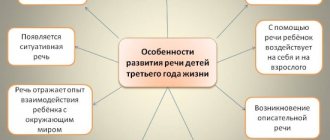When checking written work in the Russian language, the teacher not only corrects errors, but also indicates their type in the margins. It is the nature of the errors that these strange dashes, checkmarks and other squiggles indicate. Such a system allows the teacher to easily determine what grade to give to the student, and the teacher himself to understand why his grade was lowered and what rules need to be worked on. Today we will talk about what mistakes there are in the Russian language. I will classify them with examples in a convenient tabular form and help you decipher the mysterious signs that literature teachers leave in the margins of notebooks with written work on the Russian language.
Types of errors in Russian
| Symbol | Error type | Explanation | Examples |
| I | Orthographic | Errors in the spelling of words (in roots, prefixes, endings), including in the placement of hyphens, in continuous and separate spelling. | Somehow (correct: somehow), exams (correct: exams), in a fur coat (correct: in a fur coat), ran away (correct: ran away). |
| V | Punctuation | Errors in the placement of punctuation marks (incorrect choice of punctuation mark, its absence in the right place or its presence where it is not needed). | The boy crouched under the branches of a tree and ran home - where his father, who had arrived from a business trip, was waiting for him. (The boy, bending down, crawled under the branches of the tree and ran home, where his father, who had arrived from a business trip, was waiting for him.) |
| G | Grammar | Errors in the formation of words and their forms, as well as in their choice (incorrect agreement in numbers, cases). | The most beautiful (the most beautiful or the most beautiful), the richer (richer), in accordance with the decree (according to the decree), payment for travel (payment for travel or fare). |
| R | Speech | Errors in the use of vocabulary (including paronyms, homonyms, synonyms), including tautology. | Diploma of the competition (diploma of the competition), price list (price list or prices). |
| WITH | Stylistic | Use of vocabulary that has an inappropriate stylistic coloring (usually colloquial, slang). Can be considered a type of speech error. | And then the main character of the story went crazy (that’s right: he made a mistake). This episode is cool (interesting, memorable). |
| Z | Violation of paragraph division of text | The text is incorrectly divided into micro-topics or paragraphs are not highlighted at all. | |
| F | Actual | The content of the text is distorted (when writing an exposition or essay) | Dubrovsky met Masha when he was robbing Troekurov (as it actually happened, I told you earlier). |
| L | Logical | Errors in the logical construction of the text (usually they are associated with a violation of the cause-and-effect relationship). This also includes syntactic errors that lead to a distortion of the meaning or its double interpretation. | Dubrovsky was a noble robber, so he decided not to rob Troekurov. (Dubrovsky was a noble robber, so he, having fallen in love with Masha Troekurova, decided not to rob her father.) There are many works about love in Russian literature. (There are many works about love in Russian literature.) |
Schoolchildren and their parents rarely have doubts about what kind of punctuation or spelling error was made in written work on the Russian language. Everything can be seen from the teacher’s corrections. But if speech, grammatical, logical and factual errors are detected in the work, questions arise.
The Federal Institute of Pedagogical Measurements (FIPI) has developed recommendations for language teachers checking students' test papers on the classification of errors that occur in these papers. You can download a classifier table with examples from the link.
Below you will find a brief description of typical errors, compiled on the basis of the “Methodological materials for chairmen and members of subject commissions of the constituent entities of the Russian Federation on checking the completion of tasks with a detailed answer of the Unified State Examination papers” and “Methodological recommendations for preparing for the final essay”. The last document concerns creative work (essays, presentations) that students complete in the winter for admission to the Unified State Exam.
Library
November 18, 2021 · Quantity Even adults often make speech errors. Dealing with them is not easy, because it is most often impossible to rely on specific rules, and not everyone has a developed “sense of language.” The easiest way to correct speech errors is not to correct them, but to prevent them. This article is for parents of schoolchildren, but it will be useful for anyone who cannot boast of absolute literacy.
What are “speech errors” and what are they?
Children are creators by nature, where an adult thinks about what word to use, a child in a creative impulse will come up with a new one, add a prefix and suffix to it and not even notice. The rich Russian language gives the child enormous scope for creativity, and the non-obviousness of some rules allows teachers to collect funny collections of mistakes. “Horse”, “sit down”, “offend” - these cute words are real examples of speech errors, the mechanism of which does not need explanation, but we’ll talk about what to do with them next. By the way, what exactly are speech errors?
There are many classifications, but we will focus on the one that is considered the most understandable, namely the classification proposed by Fomenko. Types of errors in Russian:
- pronunciation errors (spelling);
- lexical (lexical norms are violated);
- phraseological (phraseology);
- syntactic (syntax);
- punctuation (punctuation);
- morphological (morphology);
- stylistic (stylistics);
- orthographic (spelling).
Speech errors include only those that appear in oral speech, so today we will look at:
- pronunciation;
- lexical;
- phraseological;
- morphological;
- stylistic.
Below we will analyze each of the points and tell you how to deal with such typical mistakes and how to prevent them.
Pronunciation errors
“The bell is ringing and the telephone is ringing” is a mnemonic phrase that helps you remember the correct accent.
Spelling errors are errors in the pronunciation of words and the placement of stress. Orthoepy for oral speech is as important as spelling for written speech. The most common spelling errors among primary schoolchildren occur in the following words:
- of course (of course);
- finally (in general);
- poshti (almost);
- or electricity (electricity);
- overalls (overalls);
- kolidor (corridor);
- lytsal (knight);
- liked (liked);
- slipped (slipped).
Advice: pronounce words slowly with your child and do not scold him if he returns to his usual, incorrect pronunciation. Getting rid of a pattern established in your head is not a quick process.
This also includes all types of accentological errors, that is, errors in stress. Children are often guided by intuition when placing stress, and in Russian, unlike, for example, Italian, where there are clear rules, stress is free and not always easy to determine. Most often, mistakes in accents are made in these words:
- kitchen;
- calls;
- pantry;
- cakes;
- bows;
- beet;
- turn on;
- more beautiful;
- elevators;
- spark;
- garbage chute;
- meatballs;
- breads.
Advice: mnemonic “memories” will help your child decide on the correct accent. You can find ready-made ones on the Internet or come up with your own. And then correct, explain, repeat. In this case, the principle “Repetition is the mother of learning” works two hundred percent.
Lexical errors
Lexical errors are violations of the lexical norm, most often the use of words with incorrect meanings, incorrect semantic agreement or distortion of the morphemic form.
Using a word with the wrong meaning. This is the most common lexical error, and there are three types.
- A mixture of words that are similar in meaning: “We will fight until our last breath.”
- A mixture of words that sound similar: excavator - escalator, cornet - clarinet, idea - turkey, act - advance.
- A mixture of words that are similar in meaning and sound: subscriber - subscription, addressee - addressee, diplomat - diplomat, well-fed - well-fed, ignorant - ignorant.
Word writing. Children easily come up with new words by analogy with already known ones. It turns out creative, but wrong. Examples of typical mistakes: Ossetian, Podlyuchestvo, Podgortsy, cow meat.
Violation of the rules of semantic agreement of words. Semantic agreement is the mutual combination of the meanings of words.
For example, you cannot say: “Bright gray walls,” since the word “bright” contradicts the word “gray.” “The boy ran while strolling” is a lexical error; it is impossible to “stroll” (leisurely, idly stroll) and “run” at the same time.
Lexical errors include pleonasms and tautologies. Pleonasm is “duplication of meaning,” a phrase in which the meaning of one word is entirely included in the meaning of another. Examples: “young youth”, “aristocratic prince”, “midnight”, “huge giant”.
A tautology is a phrase whose parts have the same root: “assigned a task”, “organizational organization”, “dark darkness”.
Advice: tell your child about “butter oil” and play a game with him where he will have to specially compose pleonasms and tautologies himself. You can look for them in the surrounding life (believe me, “free gifts” and “business lunches for businessmen” are just waiting for this) or in any other way concentrate the child’s attention on them.
Phraseological
A phraseological unit, also known as an idiom, is a stable expression, the meaning of which is not determined by the meaning of the individual words that make up it. Often these expressions are archaic, for example, “Walk seven miles to slurp jelly,” and it is difficult for children to cope with them. Phraseological errors occur when the form of phraseological units is distorted or they are used in a meaning that is unusual for them. Yu. V. Fomenko proposed the following typology:
- changing the basis of phraseology: “From ship to bar” instead of “From ship to ball”;
- truncation of phraseological unit: “I don’t want to throw pearls” (phraseological unit: “throwing pearls before swine”);
- expansion of the phraseological unit: “Work with your sleeves rolled up” (phraseologism: work with your sleeves rolled up);
- distortion of the grammatical form of the phraseological unit: “Hunger is not aunty.” That's right: “hunger is not a problem”;
- contamination (combination) of phraseological units: “He made a great influence on those gathered” (combination of phraseological units “to make an impression” and “to influence”);
- combination of pleonasm and phraseological unit: “Vulnerable Achilles heel”;
- the use of phraseological units in an unusual meaning: “We will dance from cover to cover” (this phraseological unit is applied to books, not to dancing).
Advice: find out with your child where the phraseological unit came from and what exactly it means; often the incorrect use of phraseological units is simply a consequence of misunderstanding.
Morphological
Morphological errors are the incorrect formation of the form of a word during inflection. When the wrong ending is added to the form of a word, etc. Very often, such errors occur not only in the speech of schoolchildren, but also in adults, respectable people. The most common types are the following.
- Incorrect endings for plural nouns in the genitive case. Not “pictures”, but “pictures”, not “loops”, but “loops”.
- Incorrect formation of the plural of nouns denoting young animals, for example: kids, donkeys, horses.
- Incorrect use of indeclinable nouns. “He came in a coat” instead of: “He came in a coat.”
- Incorrect formation of the comparative degree of the adjective: better, sharper, sweeter.
Advice: such errors are eradicated slowly and only through repeated, patient repetition. Explaining to a child why the plural of the genitive case from “socks” is “socks”, and from “stockings” is not “stockings”, but also “stockings” is quite difficult. It’s like with “dictionary” words - just learn them.
Stylistic
Stylistic errors are a large group of errors, which often include morphological, lexical, and syntactic. These are errors associated with the use of words, grammatical forms, and syntactic structures without taking into account their stylistic coloring.
- The use of a word without taking into account the emotionally expressive or evaluative connotation: “He ascended in an elevator.” Correct: “He took the elevator.” The word “ascended” is too solemn to describe an everyday situation.
- The use of colloquial and dialect words and phrases: “poklal”, “godut”, “ride”.
- Unfortunate word order in the sentence: “The boy is running merrily through the forest.” Better: “The boy runs happily through the forest.” When a child masters the norms of the language, he will be able to use the order of words in a sentence to enhance the expressiveness of the text, but first he needs to master the norm.
- Repetitions of words. Above we mentioned pleonasms and tautology; they also belong to stylistic errors.
Advice: if a child does not like to read, then read aloud to him more. Stylistic errors are often the result of a weak sense of language. Books will help with this. Draw your child’s attention to the fact that characters from different walks of life speak differently, to stylistic devices and the meaning of words.
How to deal with speech errors
Speech errors are not as easy to address in class as punctuation or spelling errors because they are very individual. If one child in the class says “pokoladnik” instead of “window sill,” then the teacher cannot concentrate on eradicating this mistake, leaving the rest of the children without attention. But the child himself will not be able to work out speech errors, because there are almost no clear rules, such as in spelling, in speech, and his “sense of language”, which helps adults, is still poorly developed. Therefore, parents often have to deal with speech errors. How to help a child get rid of speech errors?
Read
We will not discover America and the first advice will be classic: read more. Children who read passively absorb the norms of the language without even realizing it. The rules for the use of words and constructions simply settle in the heads while the young reader follows the plot. If your child does not like to read, then organize family read-alouds or read at night. Don’t be afraid to introduce your child to authors who are not classified as “children’s.” Tyutchev, Prishvin, Chekhov, Gumilyov are suitable for family reading. Yes, they will raise a lot of questions in the child and that’s great, because our next point...
Discuss
What you read, see, understand - everything needs to be discussed. Do not correct your child when he is enthusiastically telling you something, do not interrupt his thoughts, but when he finishes, be sure to gently pay attention to any mistakes that have slipped through. And discuss the mistakes yourself. Why is this word appropriate and this is not, why is it possible to say this and not. Focus your child's attention on the beauty of speech and its expressiveness, but try not to turn comments into lectures.
Lead by example
The child is a mirror. He copies his parents' facial expressions, their reactions and manner of speaking. Analyze your own speech, get rid of common words and expressions and set a good example for your child. The results will not keep you waiting.
Go from the opposite direction
If a child just can’t cope with some mistake... start making mistakes yourself and ask the child to correct you. Children love to feel smarter than adults, and this is to your advantage. By concentrating on catching you, the child will get rid of the mistake himself.
Do some extra work
The notorious “sense of language” really exists, and regular classes help develop it. A teacher in a classroom is limited by lesson time and the number of students, but modern online platforms allow you to get excellent results in 15-20 minutes of lessons a day. The iSmart platform was developed by professional teachers and contains more than a thousand exercises that meet the school curriculum. The child can study independently, since all the tasks are announced, and the first results will become noticeable after two weeks of classes.
Learn poetry
Memorizing poetry trains the brain in the same way as learning a foreign language, expands vocabulary and teaches the child the norms of literary language. Here we told you how to quickly learn a poem with your child.
Speech errors occur in almost all children, because first the baby masters the language, and only then learns about grammatical rules, and you may need a lot of patience to correct the situation. The bad news: there probably won't be any quick results. Good news: your efforts will not be in vain; competent speech will remain with the child forever.
Good luck to you!
#Unified State Exam
Types of grammatical errors
| Error number | Nature of grammatical error | Examples of grammatical errors |
| 1 | Incorrect word formation | Kowtow, mock |
| 2 | Incorrect noun form formation | I like many cakes. |
| 3 | Incorrect form of adjective | More beautiful |
| 4 | Incorrect formation of numeral form | He went shopping with only five hundred rubles. |
| 5 | Incorrect formation of pronoun form | Their talents |
| 6 | Incorrect formation of the verb form (including participles, gerunds) | They want to flow down |
| 7 | Incorrect negotiation | A group of people involved in the robbery have been identified. |
| 8 | Mismanagement | Grandma can make the cake more delicious. |
| 9 | Disruption of communication between the main members of the sentence | Most stood their ground. |
| 10 | Incorrect way of expressing a predicate | The young man was handsome and slender. |
| 11 | Incorrect construction of sentences with homogeneous members | Anti-anxiety and good mood remedy |
| 12 | Incorrect construction of sentences with participles | Thinking about good things, the anxiety still did not go away. |
| 13 | Incorrect construction of sentences with participial phrases | The sky was strewn with shining stars overhead. |
| 14 | Incorrect construction of a complex sentence | The film made me think about the meaning of life, which I watched yesterday. |
| 15 | Mixing indirect and direct speech | The critic noted that I don’t see anything new in this picture. |
| 16 | Incorrect sentence division | After the lights went out. Nothing bad happened. |
| 17 | Mixing types of tense forms of verbs | The nightingale will fall silent for a moment, and then sing again (or sing again). |
| 18 | Skipping a word | It is impossible to simplify the process (of what?). |
| 19 | Incorrect use of particles | It would be nice if we heard this work not recorded. |
There are several classifications of grammatical errors, which is why their numbers may vary.
Violation of the rules of semantic agreement of words
Semantic coordination is the mutual adaptation of words according to the principle of their real meanings. For example, the following expressions are considered incorrect:
- “Colorless black trees sway in the wind” - trees cannot be “colorless” and “black.”
- “The horses slowly rushed at full speed” is a speech error, since “slowly” (meaning slowly), and “at full speed” (galloped with all their might).
This also includes pleonasms and tautologies.
- Pleonasm is inappropriate verbosity, excessive use of words: “overall dimensions”, “first premiere”, “price list”, “young youth”.
- Tautology - phrases with a common root: “an incident happened”, “to capture impressions”, “oil”.
Types of speech errors
| No. | The nature of the speech error | Examples of speech errors |
| 1 | Using a word with a meaning that is not proper to it | Thanks to the fire, the family was left homeless. |
| 2 | Inability to distinguish shades of meaning that prefixes and suffixes add to a word | She looked effective in this dress. After the explanation, the girl’s attitude towards her fan did not change. |
| 3 | Incorrect use of synonymous words | In the final chapter, the author reveals his attitude to the problem. |
| 4 | Unjustified use of stylistically colored vocabulary (jargon, clericalism, etc.) | The hero spoke on the merits of the matter during a meeting with his beloved in the gazebo. |
| 5 | Unjustified use of emotionally charged words and phraseological units. | Gogol knew how to make people laugh. |
| 6 | Unjustified use of colloquial expressions | The hero squandered his entire fortune. |
| 7 | Errors in lexical compatibility | The work has the following artistic means. |
| 8 | Speech insufficiency (missing a word), speech redundancy (extra words) | Attract readers to the problem raised. Very beautiful landscapes. |
| 9 | Tautology (the use of words with the same root in one sentence or neighboring ones) | The story tells about the life of a common man. |
| 10 | Unjustified repetition of a word | I liked the book. The book talks about love. The book is written in living language. |
| 11 | Uniformity of syntactic constructions | When the young man saw the girl, he fell in love with her at first sight. When the hero met the bear, he was not afraid. |
| 12 | Poor use of pronouns | This novel was written by Pushkin. It is recognized as a masterpiece of Russian literature. |
Speech errors (unlike grammatical ones) are associated not with the construction of language units, but with their use.
Reviews and comments
Now you can practice and find speech errors in this article or share other examples you know. Also, take a look at our literacy course.
We also recommend reading:
- Storytelling
- Learning your native language: a selection of useful materials
- Our. Native. Russian.
- How to learn to speak beautifully
- Lukomorye, cat and literacy
- Learning a foreign language: old rules about the main thing
- Orthoepy - why it is important to speak correctly and how these rules arise
- Recommendations for learning Russian
- Development of speech culture
- How to independently learn to write correctly in Russian
- Six ways to learn from your mistakes
Keywords:_D1048, _D1049, 1Russian, 1Storytelling
Types of logical errors
Logical errors are associated with incorrect construction of a monologue statement (essay text, presentation). They can be different, ranging from violation of cause-and-effect relationships to omission of important parts, distraction to other topics.
Here are the most common logical errors:
- the sequence of statements is broken;
- there is no connection between parts of the utterance;
- the already stated judgment is repeated several times;
- a micro-theme includes another micro-theme;
- parts of the statement are disproportionate;
- a necessary part of the statement is missing (logical leap);
- cause-and-effect relationships are broken;
- the logical-compositional structure of the text is disrupted;
- there is a comparison of the incomparable.
You can give examples of logical errors in different parts of the text.
An unsuccessful opening can be characterized by the fact that the first sentence contains a reference to context, which, of course, is absent before the introduction. For example, when the text begins with the words: “In this work...”.
In the main part of the text, disparate concepts may be brought together in one sentence, for example: Prostakova mocked the serfs and was forced to take care of giving her son a decent education.
Logical errors in the central part of a statement also include an incorrect sequence of sentences, when, for example, one thought is expressed, then another, then a return to the first is made.
Violation of cause-and-effect relationships is also observed, most often, in the main part of the text.
Examiners will consider a conclusion duplicated in two sentences to be an unsuccessful ending
The most common lexical errors
- Wrong choice of word (bone type of thinking, analyze the life activity of writers), inaccurate choice of synonym (I received an excellent grade for my answer).
- Violation of norms of lexical compatibility (a herd of hares, under the yoke of humanity).
- The contradiction between the speaker’s intention and the emotional and evaluative shades of the meaning of the word (Pushkin correctly chose the path of life and followed it, leaving indelible traces. He made an unsustainable contribution to the development of Russia).
- The use of anachronisms, i.e. historically incompatible concepts (Lomonosov entered the institute);
- A mixture of concepts from different cultures (Lomonosov lived hundreds of miles from the capital).
- Incorrect use of phraseological units (We need to bring him into fresh water).
Lexical compatibility
Often speech errors occur due to the fact that phrases are constructed incorrectly and consist of words that do not fit together:
Thanks to careless handling of fire, the forest burned out. (Need: Due to careless handling of fire, the forest burned out.)
Caring for nature is of great importance in our time. (Need: In our time, caring for nature is of great importance.)
Lesson summary of the Russian language “Lexical norms”. Other notes on the section “Language Norms”:
- Syntactic norms
- Morphological norms
- Orthoepic norms
- Language norms (general)
Errors in similar words
One of the most common types of lexical speech errors is the incorrect use of words that are similar in meaning or sound. Among them are:
- Paronyms are words that sound similar, but have completely different meanings. Example: painting and signature, justification and basis.
- Pleonasm is an excessive repetition of words with similar meanings, which results in duplication of meaning. Example: top priority, first premiere.
- Tautology is a special case of pleonasm, when words are generally identical in meaning. Example: having an illness, torrential downpour.
- Incorrect use of synonyms is the use of a word with a similar or identical meaning, but the shade or scope of use is inappropriate for the given context. Example: this name is familiar in many countries (the name is known), on legal grounds (legally).
- Confusion of vocabulary is the unjustified use in a sentence of borrowed words, slang or professional vocabulary, archaisms or neologisms, as well as clericalisms. Example: in order to provide sweets for the holiday in a timely manner, targeted delivery will be carried out, hurry up to take part in the promotion on new powerful computers.
Some of these violations are so common that they have even become memes.
One of the most common pairs is the words “dress” and “put on.”
The saying “They put on clothes, they put on Hope” helps not to get confused: dressing someone correctly, but putting something on correctly.
Wrong:
Right:
Misuse is also common in the pair "effective/effective".
“Effective” means making an impression, and “effective” means leading to the desired result.
Wrong:
Right:
Errors in words expressing attitudes towards each other
Lexical units that reflect the relationship of words to each other are called hyperonyms (denoting a more general generic concept) and hyponyms (when talking about a more specific concept). For example, a hyperonym for the word “table” will be “furniture”, and for the word “rose” – “flower”.
From a logical point of view, this sentence is constructed incorrectly, because shoes are shoes.
Errors due to inattention
Often authors simply do not re-read what they have written, and the result is nonsense. Here are two funny examples:
- “Here housing and communal services treat the ice with special chemicals to ensure safe traffic” - Here it is, the secret of safe traffic.
- “In this case, the site may, out of duty, be outside the TOP” - Probably out of honor.
Speech redundancy and speech insufficiency
Pleonasms are figures of speech that combine words of the same meaning, which are unnecessary from the point of view of logic: dark darkness, dreamed in a dream, speak in words.
A type of pleonasm is tautology - repetition of the same judgment or definition, unjustified use of cognate words, “butter”: Can I ask a question? The holiday is getting closer and closer. The artist depicted the image. Correction: Can I ask a question? The holiday is getting closer. The artist depicted the hero (created the image).
In the language of fiction, in poetic language, tautology can be used as an artistic technique of repetition, enhancing the expressiveness of speech: I don’t know, I don’t know; the yard is white and white; An old, old old man stood on the threshold.
Some cognate words have lost their lexical connection with each other: black ink; white linen, red paint.
Speech insufficiency is expressed in the omission of words, which gives rise to a logical error: Bazarov’s character is sharply different from the Kirsanov brothers. (Need: from the character of the Kirsanov brothers.)
Mixing paronyms
Paronyms are words that are similar in sound, but different in meaning: telephone subscriber - concert subscription, spectacular outfit - effective reception, hard sofa - brutal battle, etc.
Many people confuse the cognate verbs dress (dress) and put on (put on). You can dress someone, you can put something on (on something): Dressing a capricious child is quite difficult; When it’s cold, I put overalls on him.
We recommend reading “Don’t lose your sense of joy!”: an interview with writer Ekaterina Sobol
Types of factual errors
Factual errors involve misrepresentation of information. Typically, these errors occur when referring to works that the student analyzes in his creative work.
Factual errors include:
- distortion of the content of the work, its fundamentally incorrect interpretation, poorly chosen example;
- paraphrasing a quote, inaccuracy in it, attributing a statement to another author;
- presenting facts that do not correspond to reality (including historical ones);
- distortion of the names and surnames of writers, heroes, titles of literary works.
Factual errors may also consist of obvious exaggeration or understatement of an event or phenomenon referred to by the author of a creative work.
Factual errors are not language errors.
Types of inaccuracies in speech
Speech errors usually include all kinds of cases in which there is a deviation from current language norms. Without their knowledge, it can be difficult to live normally and communicate with other people, but almost any person makes such mistakes in their speech.
There are several different classifications of such errors, but the most common and generally accepted is the one compiled and proposed by Doctor of Philology Fomenko. He compiled it simply, without academic complexity and pretentiousness :
- pronunciation errors (pronunciation rules);
- phraseological (phraseology);
- syntactic (syntax);
- punctuation (punctuation);
- lexical (vocabulary);
- morphological (morphology);
- stylistic (stylistics);
- orthographic (spelling).
Important Note
As part of the school curriculum, the basic rules of the Russian language are studied, but not all. If an error is made according to a rule that students did not go through, it is corrected, but is not taken into account when evaluating the work. The teacher should do the same with graphic errors (obvious typos, clerical errors). We will talk in more detail a little later about how written works in the Russian language are assessed, for which mistakes the mark is reduced and by how many points, and which mistakes are not taken into account. The purpose of this article was to help you understand what errors there are in the Russian language, what type are those that the teacher discovered in a particular work. I hope I completed the task I set myself.
Share
- 2
Is it so important to maintain a culture of speech?
Careless speech, replete with errors, like sloppiness in clothing, makes an unfavorable impression. Agree that it is difficult for a person with such qualities to avoid interference in communication and build harmonious relationships with others.
And, on the contrary, mastering the culture of speech allows you to improve the level of any area of life, be it career, family or self-development. Through speech, the values cultivated by a person are manifested: moral, scientific, philosophical.
When you hear a person speak, you can immediately understand who you are dealing with. Respect for yourself and others is also about the culture of speech.
As he says! Do you want to hear this addressed to you? Work on your mistakes.
Why do speech errors occur?
Incorrect pronunciation can develop during human development, for example, distortion of words in childhood. Poor command of a language, if it is not native to people, always leads to the appearance of many speech errors. If there are diction defects, pronunciation becomes difficult, which causes spelling errors. Sometimes people simply misspoke during a conversation; in such situations, speech errors resemble typos in written texts. There can be many reasons for the formation of speech errors, but a person should strive to get rid of this problem. Speech that contains many errors can cause a lot of trouble:
- Difficulties in getting a job;
- Poor public performances;
- Constant ridicule and, as a result, low self-esteem;
- Difficulty expressing thoughts or misunderstanding from people around you.
In order to get rid of speech errors, you should find out the cause of the problem and get rid of it. For example, distorting words in random order requires increased attention. Incorrect pronunciation due to ignorance is corrected through additional study of the weak points of the language.
Most people make mistakes due to inattention, which can be easily compensated for by systematic training on the BrainApps resource. The site is useful because it creates an individual program based on a preliminary test and allows you to clearly see your own results.
Online services for checking for lexical errors
The above services are not new - they are only more popular than other resources we use. Below we will briefly explain why.
Compatibility dictionaries
Using dictionaries, the compatibility of words is usually checked and more suitable synonyms are selected.
Services for searching and correcting errors in text
Next, we list directly the programs with which you can find lexical errors in the finished text. To do this, let’s test them using the examples mentioned above, as well as a test text specially composed with lexical errors:
The fire grew hotter and hotter. The tourists were busy with their activities. Thanks to the fire that broke out from the fire, a large area of the forest burned down. All that remains of the mighty trees are smoldering heads. The fireman approached the lonely boy, he was short, and handed him fresh clothes. The boy immediately put on a new shirt and pants. In the month of October it is already usually cold, but now the hot earth still held the heat.








